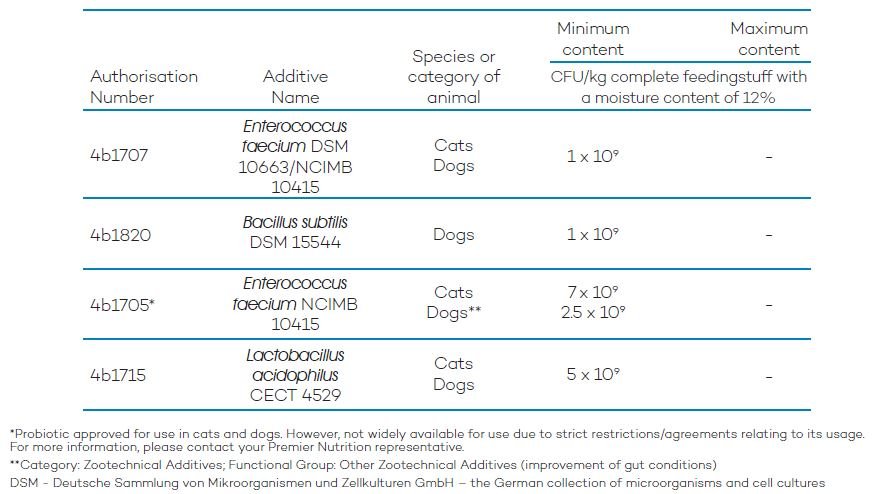- Home
- Probiotics for cats & dogs
A fourth probiotic has become approved for use for both cats and dogs and has now been included within our “Approved Probiotics” listing (see below for details).
This probiotic, Lactobacillus acidophilus CECT 4529, has the authorisation number 4b1715 and has a legal minimum required content of 5 x 109 CFU/kg complete feedingstuff (88% dry matter basis), with no legal maximum. However, it is important to note that this probiotic is not available for widespread use, but should it be of interest, please do discuss with your Premier Nutrition Account Manager who will be able to assist you.
Probiotics are live microbial feed supplements which benefit the host animal by improving the gut (gastrointestinal) microbial population and therefore resulting in improved gut and overall host pet health. Administration has been proven to be most effective when there is a gut challenge present. However, to be at their most effective, intake must be in sufficiently large enough quantities and administered on a daily basis.
There are three key modes of action for probiotics:
With all this in mind it is not surprising that for a number of years now, probiotics have been added to complete diets, snacks, treats and supplements, especially those specifically targeted at or claiming to have positive benefits on gut health.
For more information on probiotics in pet foods, please request a copy of our Technical Briefing “Probiotics in Pets Foods (in Europe)” from your Premier Nutrition contact.
Probiotics are considered feed additives and like all other feed additives are listed on the EU Community Register of Feed Additives with restrictions governing their use.
Up until December 2017, there was only a single probiotic widely approved for use for cats and dogs and that was 4b1707 Enterococcus faecium DSM 10663 / NCIMB 10415 which has a legal minimum required content of 1 x 109 CFU/kg complete feedingstuff (88% dry matter basis). This probiotic is available at Premier Nutrition and should it be of interest to you, please contact your Premier Nutrition Account Manager for further details.
However, December 2017 saw the authorisation of another probiotic for dogs (authorisation excludes cats at this present time), which has been approved and widely used in other animal species for a number of years, with its publication in the EU Community Register of Feed Additives taking place in January of 2018. This probiotic, authorised as 4b1820 Bacillus subtilis DSM 15544, with a legal minimum required content 1 x 109 CFU/kg complete feedingstuff (88% dry matter basis) is available to purchase or for inclusion into appropriate supplements from Premier Nutrition.
There is no legal maximum laid out for either of the above two probiotics for cats and dogs and dogs respectively.
Category: Zootechnical Additives
Functional Group: Gut Flora Stabilisers
The approval of a number of probiotic species for use in pet foods can only be welcomed to allow for some flexibility and variety when formulating our companion animal diets, snacks, treats and supplements. However, it is important to note that their use must be in line with the regulations and provisions laid out in the EU Community Register of Feed Additives as well as their availability to the market for use. Additional consideration should also be made for the type of product and process that it undergoes and any application to dry extruded products should be made externally to preserve the live microorganisms.
For further information on this article please contact your Pet Nutrition Account Manager, or alternatively, please e-mail info@premiernutrition.co.uk